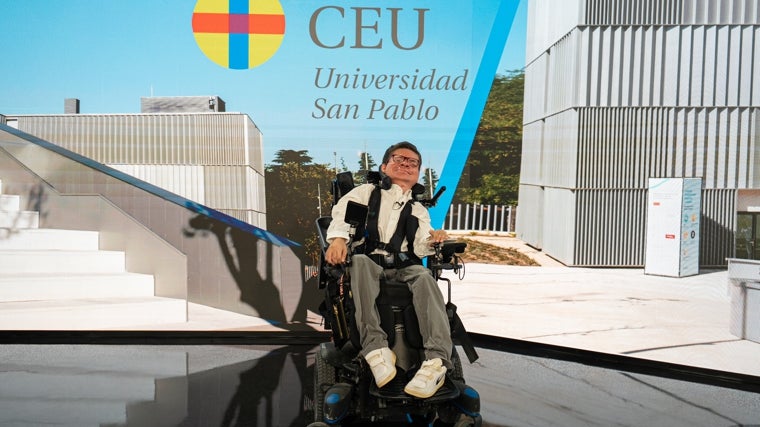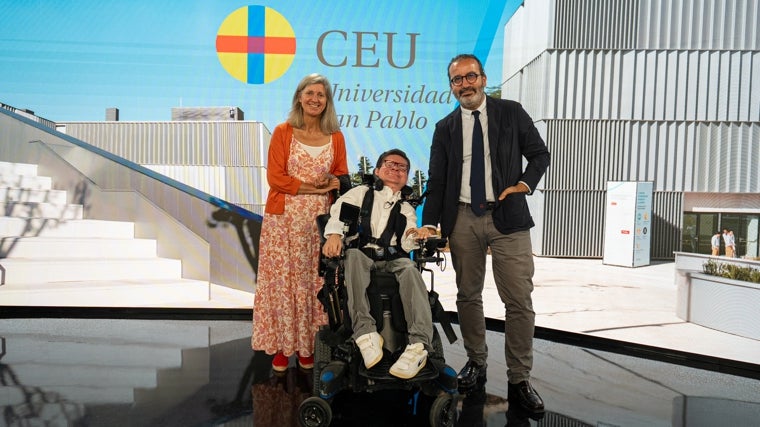"My life expectancy was 18 years. I've already had three years left. That's why I come to class every day like it's a party."

Andrés Marcio is 21 years old, studies Journalism at CEU San Pablo University, and speaks with disarming conviction . He lives with a rare, chronic disease with an unpredictable progression, but what's most impressive isn't his diagnosis, but his joy. "Since I was little, I knew I wanted to work in television or radio. Cameras drive me crazy ," he says, with that smile that never seems to leave him. He says it as if it were the most normal thing in the world, and perhaps it is: for him, fulfilling his dream is a matter of stubbornness, as he defines himself with a laugh, but also of a university that adapts to the needs of its students.
He has congenital laminopathy, an ultra-rare disease that only affects ten people in Spain. "I always say it's like a flea market, because we have everything," he summarizes humorously. He has respiratory failure, extremely low lung capacity, dropped head syndrome, reduced mobility, and a serious heart problem that requires him to wear a pacemaker with a defibrillator 24 hours a day. "The heart keeps getting bigger, and that can cause malignant arrhythmias and sudden death," he explains. But he quickly adds: "We have a life expectancy of 18 years. I've already had three as a gift, so every day is a celebration. When I wake up, I thank God and life for still being alive."
The most surprising thing is that he shares everything naturally. Not with resignation, but with enthusiasm. "I believe that if your mind is healthy, the state of your body is secondary," he says. And in his case, that mind shines: he gets good grades, has a prodigious memory, gives motivational talks, and combines his studies with his work at Telemadrid , thanks to the trust of Javier Callejo, another of his "caregivers," he acknowledges.
In class, he's just another student, although the path to becoming one hasn't been easy, as he was rejected by another university. His mother, Beatriz, acknowledges this, and she has always been there for him. "When Andrés said he wanted to study journalism, it seemed like a very difficult thing to do," she admits. "But he was clear about it. We've always encouraged him to pursue his dreams . And thanks to CEU, he's achieving them."
 Andrés Marcio, at the facilities of the Faculty of Humanities and Communication
ABC
Andrés Marcio, at the facilities of the Faculty of Humanities and Communication
ABC
The university, she explains, had never faced a case like hers, but they did it with the most important thing: adaptation and being one of her caregivers. "From the very beginning, they told us: we don't know your situation, but we will do everything in our power," Beatriz recalls. "And that's how it has been. The most valuable thing is that they have been able to understand your reality and adapt to it ." For the family, finding a university that understands, cares, and supports has been key: "It gives us life and absolute peace of mind," she summarizes. "In the mornings, I feel so calm knowing that Andrés is here, happy and well cared for."
For his part, he's clear: "The values I highlight about CEU are many, but if I have to choose, I'd say the closeness, the joy you feel, and the flexibility," he explains. "Here, there's always someone listening, encouraging, and helping you. The people are happy. And it shows. I come here every day, delighted ." He recalls one day in particular: he had an exam, but a taxi strike prevented him from arriving. "I wrote to the professor, and they let me take it the next day. They understand me, and that's something I value greatly."
His classmates are also an essential part of his university experience. "They're the best in the world," he says jokingly. "Of course, each with their own thing: Jaime is a big Madrid fan, and I can't stand him anymore this year. Gonzalo doesn't pick up the phone when he's having exams, and when he does, he tells me I've been talking to him for three hours. Of course! I love talking." That complicity also extends to social media, where he shares his daily life with humor and naturalness . "We upload daily videos with my friends Jorge and Jaime. We show everything I do, so follow me: @andresmarciolona, on TikTok and Instagram," he says, without missing a beat.
For Pablo Velasco Quintana, dean of the Faculty of Humanities and Communication Sciences, Andrés's case is an example of CEU's commitment to personalized education. "Our university was born from the desire to serve the common good. And that means getting to know each student and bringing out the best in them ," he says. "When we encounter students going through complex medical situations, the first thing we do is listen to them. And from there, we support them. It's not just about facilitating, but about caring."
This care is not an exception, but rather part of the university's DNA. "The university is a community of students and professors who together seek the truth, with tutors assigned from the first year onwards. And that's why it must be innovative: because no two students are the same , and because every story deserves to be fully experienced," says the dean.
 Andrés Marcio, with his mother, Beatriz, and Dean Pablo Velasco Quintana
ABC
Andrés Marcio, with his mother, Beatriz, and Dean Pablo Velasco Quintana
ABC
Beatriz, meanwhile, sends a message to other parents in similar situations: "At first, what you feel is protective. Keep them home, don't take risks. But to be happy, you have to be brave . And in the end, it always pays off."
And Andrés proves it . Every day. With his contagious laugh, his backpack on his shoulder, and his luminous way of inhabiting the world .
ABC.es





